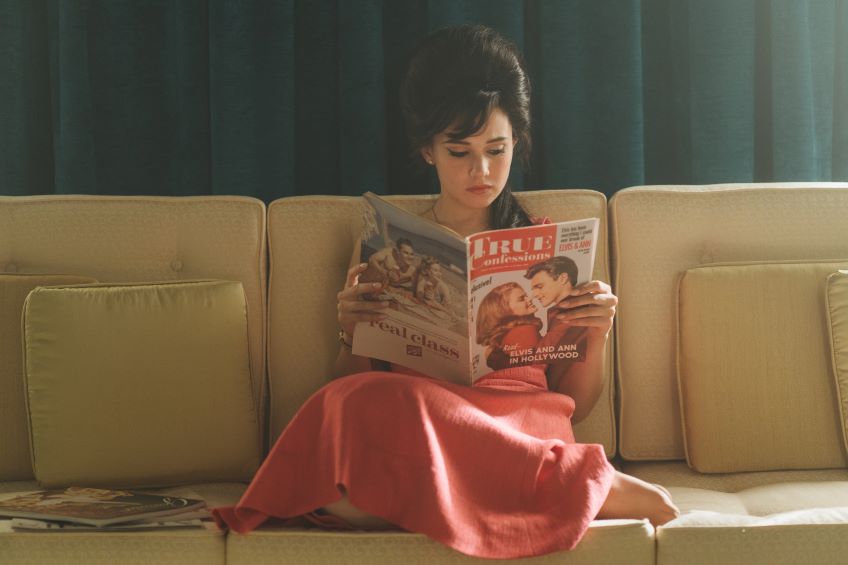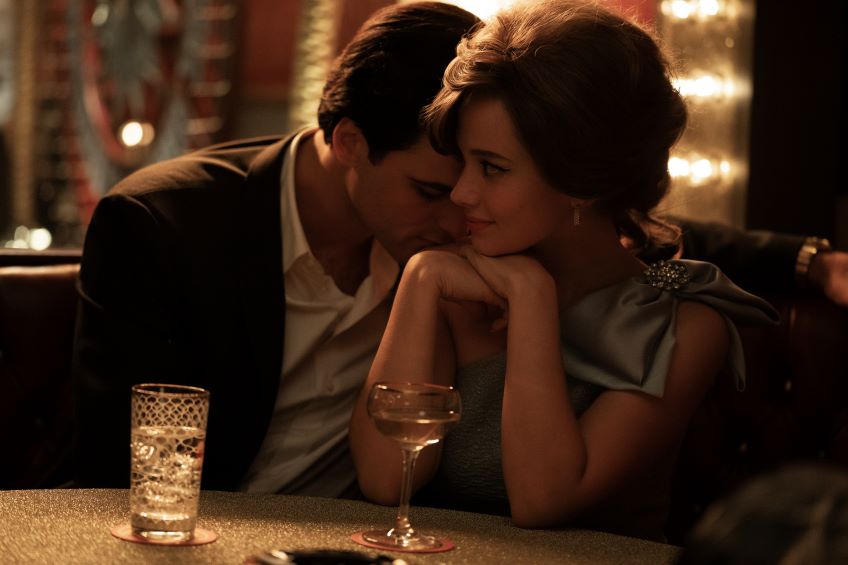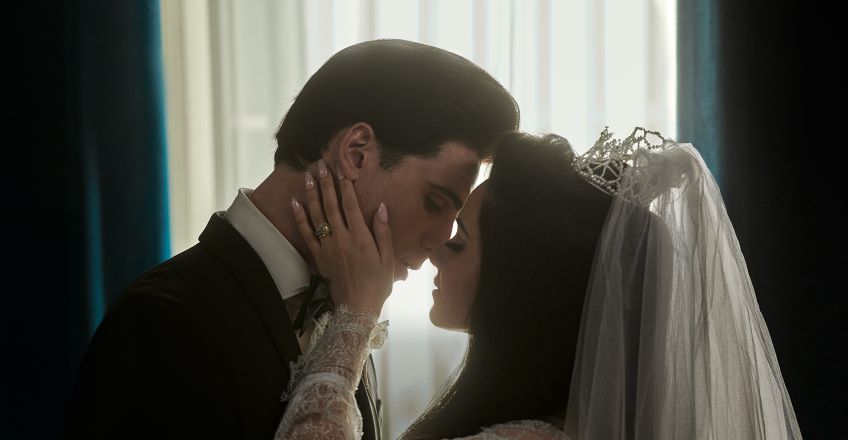Joyce Glasser reviews Priscilla (January 1, 2024) Cert 15, 112 mins.
Just a year ago, Baz Luhrmann’s two-and-a-half-hour biopic Elvis received eight Oscar nominations, but you might not recall the ten minutes in which Elvis’s wife, Priscilla, appears. Luhrmann did not consider her as important as Elvis’s parents, his musical influences, his music, or his self-serving, manipulative manager, Colonel Tom Parker. And you got the impression neither did Elvis.
Now, Sofia Coppola, who emerged from the shadow of her own famous relations to cast a light on others trapped in their respective gilded cages (Lost in Translation, The Virgin Suicides, Marie Antoinette, Somewhere), gives Elvis’s wife her own eponymous movie. And Tom Parker is all but absent. But Priscilla is not only the subject of the film; she is also the Executive Producer and Coppola’s script is a toned down version of Priscilla’s memoir, Elvis and Me. The film is no mud-slinger but Luhrmann’s image of Elvis as the tragic hero has been tarnished.
We enter Elvis’s (Jacob Elordi) life in medias res. It is 1959; Elvis is 24 and world famous, but not performing. He’s been conveniently drafted into military service in West Germany in a patriotic pause to redeem his reputation after a potential scandal. It is the only time in his life Parker permits Elvis to leave the USA, but his singing is confined to informal gatherings at his special barracks, where Elvis’s friend Terry West (Luke Humphrey), who programmes musical entertainment at the base, ensures there are a number of girls along with the fawning young men.

Priscilla Beaulieu (a terrific Cailee Spaeny), a button-cute, fourteen-year-old in a mousy brown pony tail, is an ordinary student at the base, but lonely and missing Texas when Terry spots her. He persuades the Beaulieus to let Priscilla attend a party at Elvis Prestley’s. Assurances about decorum overcome any objections.
Coppola lets us imagine how it feels being ushered past the faceless fans stationed outside Elvis’s residence and into the packed inner sanctum. With her school girl clothing, diminutive size, shyness and sheltered youth, Priscilla looks, and is, uncomfortable. Coppola uses the cast’s physical differences to introduce the first element of dominance to the story. The noticeable ten-year-age gap is accentuated by the height difference. Elordi, who does not look like Elvis, but sounds like him, is 6’4” (1.92 m), to Spaeny’s 5’0” (1.52m), so Priscilla must look up to him like a toddler to an adult. Elvis is smitten and clears a seat next to him. They are both homesick, and Elvis could use a little affection: his mother has recently died, aged only 46.
Coppola invites us to share the fairy tale fantasy. The following day Priscilla floats down the school corridor with a faraway smile frozen on her face, to the beat of Tommy James & The Shondells’s Crimson & Clover (which wasn’t written until 1968). When the phone rings, with a message that Elvis would like to see her again, Priscilla knows it wasn’t a dream.
Their dating starts normally enough with a movie (Casablanca), during which the Hollywood star impresses his date with his knowledge of cinema. He confides in her that he wants to study at the Actors Studio in New York and be a serious actor, like Bogart and Brando (as opposed to doing the cheesy musicals Colonel Parker lines up for him). It’s the only time in the film we feel sorry for Elvis.
Elvis’s return to Memphis leaves Priscilla pining away. And so it is that after two years of long distance phone calls, during which Elvis assures Priscilla that rumours of an affair with Nancy Sinatra et al are false, he sends her a first class plane ticket.
Shortly after arriving at Graceland, Priscilla goes up to her bedroom and dons a flimsy nightgown. Instead of romance, Elvis tells her it’s not the right time and gives her a sedative that knocks her out for two days. She’s well rested for a trip to Las Vegas where he feeds her prescription drugs to keep up with him. Priscilla enjoys being dressed up and grown up so much she doesn’t notice they are never alone.

In 1963, when Priscilla is 17, she moves to Graceland, with Elvis reassuring her parents that she will complete her senior year of high school at a Catholic girls’ school in Memphis and will live with his father, Vernon (Tim Post) and stepmother. There’s a scene in the film where Priscilla tells Elvis that her favourite song is Jailhouse Rock. She soon realises that Elvis’s famous house is a jail. Vernon discourages her from fraternising with the two women who run the office at Graceland; she cannot have school friends over and she is prohibited from working in a boutique to quell the boredom (“When I call you, I need you to be there for me,” Elvis explains).
When Elvis is at Graceland he calls the shots. He dictates what colour Priscilla’s hair should be (dark black like his, with false eyelashes to bring out her eyes) and what she should wear. He takes Priscilla shopping, surrounded by his male entourage who agree with Elvis as he passes judgement on the outfits Priscilla models in the store. Her preferences for patterned dresses are shot down.
The absence of Presley’s music (whether a deliberate choice or a legal impediment) helps us to disassociate the increasingly abusive husband from the ferociously talented singer. It helps us to see Elvis as Priscilla must have after a while: without the lens of fame and idolatry distorting the view.
But the film is front loaded, with scene after scene demonstrating Priscilla’s lack of agency and isolation. Elvis’s drug-fuelled Vegas years – which coincided with their daughter’s formative years – gets one big scene. Priscilla’s decision to leave one of the biggest stars in the world after six years – with a possible custody battle over Lisa Marie – is too sudden and seemingly spontaneous.
And for a film entitled Priscilla, there is no hint of the successful businesswoman the passive wife would become after Elvis’s – and his father’s – deaths. There is no attempt to reconcile her autobiography and this film with Priscilla’s life after fleeing the house of horror. Yet, after saving Graceland by turning it into one of the most successful tourist attractions in the world, Priscilla (now 78) has spent the rest of her life preserving Elvis’s reputation.




